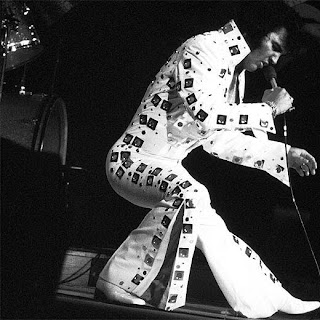terça-feira, 21 de dezembro de 2010
terça-feira, 26 de outubro de 2010
sexta-feira, 22 de outubro de 2010
Trintas
segunda-feira, 18 de outubro de 2010
Veja minhas fotos no Shtyle.fm
quinta-feira, 16 de setembro de 2010
Agora
quinta-feira, 8 de julho de 2010
The picture of Dorian Gray
The artist is the creator of beautiful things.
To reveal art and conceal the artist is art's aim.
The critic is he who can translate into another manner or a new material his impression of beautiful things.
The highest, as the lowest, form of criticism is a mode of autobiography.
Those who find ugly in beautiful things are corrupt without being charming. This is a fault.
Those who find beautiful meanings in beautiful things are the cultivated. For these there is hope.
They are the elect to whom beautiful things mean only Beauty.
There is no such thing as a moral or an immoral book. Books are well written, or badly written. That is all.
The nineteenth-century dislike of Realism is the rage of Caliban seeing his own face in a glass.
The nineteenth-century dislike for Romanticism is the rage of Caliban not seeing his own face in a glass.
The moral life of man forms part of the subject-matter of the artist, but the morality of art consists in the perfect use of an imperfect medium. No artist desires to prove anything. Even things that are true can be proved.
No artist has ethical sympathies. An ethical sympathy in an artist is an unpardonable mannerism of style.
No artist is ever morbid. The artist can express everything.
Thought and language are to the artist instruments of an art.
Vice and virtue are to the artist materials for an art.
From the point of view of form, the type of all the arts is the art of the musician. From the point of view of feeling, the actor's craft is the type.
All art is at once surface and symbol. Those who go beneath the surface do so at their peril. Those who read the symbol do so at their peril.
It is the spectator, and not life, that art really mirrors.
Diversity of opinion about a work of art shows that the work is new, complex and vital.
When critics disagree the artist is in accord with himself.
We can forgive a man for making a useful thing as long as he does not admire it. The only excuse for making a useless thing is that one admires it intensely.
All art is quite useless.
Oscar Wilde
terça-feira, 6 de julho de 2010
A importancia do Peido
quarta-feira, 30 de junho de 2010
sexta-feira, 7 de maio de 2010
Humidade
Subitamente, todas as musas morreram de estupidez e assim instalaram um ecran vazio, que outrora lhes pertencia, dentro da imaginacao de cada poeta que tentou outras alternativas. Recorreram ao axixe, experienciaram over-doses de comida, excitaram-se com outras cadelas e finalmente morreram os poetas, o sexo foi banido das mentes juntamente com a preversidade. Nas ruas mais obscuras da cidade onde as senhoras de meia idade de semblante simpatico se estendem agora nuas para arejar o corpo ao sol, oferecendo o humido misterio que guardam entre as pernas aos trauseuntes.
Os peos ainda em jogo, no baralho das putas que se entreabanam numa confusao de pessoas com a subita necessidade de cederem ao estranho desejo de se movimentarem mais que o seu opositor, neste caso, o outro individuo.
terça-feira, 2 de março de 2010
NEWS: La CE aprueba por primera vez en 12 años un cultivo transgénico
Bruselas también ha aceptado la comercialización en Europa de tres variedades de maíz transgénico de Monsanto, los derivados del maíz MON 863, de acuerdo con una declaración del ejecutivo de la UE.
La verdadera novedad es la autorización de la papa Amflora, un tubérculo diseñado por la empresa BASF para el uso industrial para piensos de animales. La Comisión Europea no había dado su luz verde a los cultivos transgénicos en Europa desde 1998.
From: www.elmundo.es
link: http://www.elmundo.es/elmundo/2010/03/02/ciencia/1267528282.html
quinta-feira, 11 de fevereiro de 2010
quarta-feira, 13 de janeiro de 2010
AZZURO
{artist: Adriano Celentano}
[Cm] [G7][Cm] [G7][Cm]
[Cm]Cerco l'e[G7]state tutto l'[Cm]anno[G7] e all'improv[Cm]viso[G7] eccola [Cm]qua
[Fm]Lei è par[C7]tita per le [Fm]spiagge[C7] e sono [Fm]solo[C7] quaggiù in [Fm]città
[C]sento vo[G7]lare sopra i [Em7]tetti[A7] un aero[D7]plano[G7] che se ne [C]va [G7]
{soc}
Az[C]zurro, il pomeriggio è troppo azzur[D7]ro e [G7]lungo, per [Dm7]me[G7]
mi accorgo di non a[C]vere più ri[G7]sorse [C]senza[G7] di [C]te [C7]
e al[F]lora io quasi [Em]quasi prendo il [Am]treno e [F]vengo[A7] vengo da [D7]te[G7]
Ma il [C]treno[C/Bb] dei desi[Am]deri[Fm] nei miei pen[C]sieri all'incon[F]tra[G7]rio [C]va
{eoc}
Cerco un po' d'Africa in giardino, tra l'oleandro e il baobab
come facevo da bambino, ma qui c'è gente, non si può più
stanno innaffiando le tue rose, non c'è il leone, chissà dov'è
{soc}
Azzurro, il pomeriggio è troppo azzurro e lungo, per me
mi accorgo di non avere più risorse senza di te
e allora io quasi quasi prendo il treno e vengo vengo da te
Ma il treno dei desideri nei miei pensieri all'incontrario va
{eoc}
Sembra quand'ero all'oratorio, con tanto sole, tanti anni fa
Quelle domeniche da solo in un cortile, a passeggiar,
Ora mi annoio più di allora, neanche un prete per chiacchierar.
{soc}
Azzurro, il pomeriggio è troppo azzurro e lungo, per me
mi accorgo di non avere più risorse senza di te
e allora io quasi quasi prendo il treno e vengo vengo da te
Ma il treno dei desideri nei miei pensieri all'incontrario va
{eoc}







